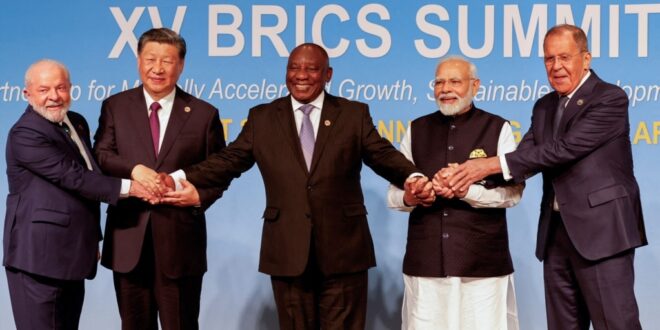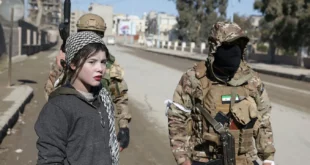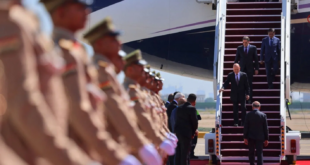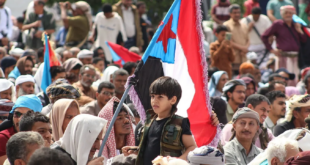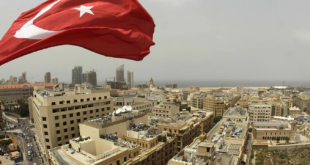As Russian President Vladimir Putin hosts leaders for the 16th annual BRICS summit, he’s looking to signal to the West that Moscow is not isolated on the world stage.
Putin will drive that message home in Kazan from October 22-24 as he positions the BRICS grouping of countries as a counterweight to the West in global politics and trade through a newly expanded version of the bloc sometimes referred to as BRICS+ that includes Egypt, Ethiopia, Iran, and the United Arab Emirates, as well as previous members Brazil, Russia, India, China, and South Africa.
“BRICS once again has fresh air coming into its lungs, in part because the Western-led order and its organizations are experiencing disarray,” Carlos Solar, a senior fellow at the Royal United Services Institute, a London-based think tank, told RFE/RL. “The larger idea is that the world is changing and what happens next for international banking, finance, and law could define which regions of the world will be the most important in the decades to come.”
This year’s summit could also set the stage for further expansion, and Putin has also invited more than two dozen other countries that have applied for or are considering membership in the growing club that includes Azerbaijan, Belarus, Turkey, and Mongolia.
He will also have bilateral meetings with other visiting heads of state in Kazan, including Chinese leader Xi Jinping, who is also looking to grow BRICS as part of Beijing’s wider strategy to position itself as a leader for the developing countries in the so-called Global South.
“Putin [has] explicitly said that the BRICS speaks for the Global South. That’s an argument that China has also been making,” Stewart Patrick, a senior fellow at the Carnegie Endowment for International Peace, told RFE/RL.
“For China, as for Russia, the hope is that BRICS+ will be a vehicle to challenge the Western-dominated international order and particularly the dominance of the United States.”
What Is BRICS and Why Does It Matter?
In 2006, Brazil, Russia, India, and China created the BRIC group, which expanded into BRICS in 2010 with the addition of South Africa.
The group was designed to bring together the world’s most-important developing countries to form an alternative to the political and economic power of the wealthier nations of North America and Western Europe.
BRICS members have from the start argued that Western countries dominate important global bodies such as the International Monetary Fund (IMF) and the World Bank, which lend money to governments, and that a counterweight to give a louder voice to emerging economies is needed.
In 2014, BRICS set up a New Development Bank to lend money to boost infrastructure and, in January, Egypt, Ethiopia, Iran, Saudi Arabia, and the U.A.E. were invited to become members.
But a Saudi minister said shortly afterward that Riyadh had not officially joined the group.
Argentina was also invited to join, but President Javier Milei pulled out in December 2023 shortly after taking office.
Still, the newly expanded group has a combined population of about 3.5 billion — 45 percent of the world’s inhabitants — and their economies are worth around 26 percent of the world economy.
Should Saudi Arabia become a member, BRICS members would also produce roughly 44 percent of the globe’s crude oil.
Why Do Countries Want To Join BRICS?
The globally scattered members of BRICS have sometimes made it an awkward grouping, but it is growing despite geopolitical disruptions like Russia’s war in Ukraine and an intensifying rivalry between China and the United States.
As Solar explains, interest in joining BRICS has only grown, with many developing countries seeing the grouping as a useful vehicle to search for a geopolitical balance in the years ahead.
“You have many countries in the BRICS — like China, Russia, India, and Brazil — with global ambitions,” he said. “But for other countries joining or applying to join, it’s about having different options and not putting all their eggs into one basket.”
He said this can even be seen with countries like Brazil and India, who are key members of BRICS but also maintain strong ties and membership in Western-led groupings and political bodies.
Financial coordination is a top issue for the group as leaders look to lessen the dominance of the U.S. dollar in global trade, with Brazil and Russia even suggesting the creation of a BRICS currency.
BRICS nations have also looked to develop more trade links within the bloc, closer coordination between their banks, and better harmonization of their tax and customs procedures.
While talks about creating a global reserve currency have so far not progressed, BRICS members have focused on facilitating trade in their local currencies, something that has proved helpful for Russia as it has looked to weather the bite of Western sanctions over its war in Ukraine with expanded trade links to China and India.
“BRICS has been and can be an even bigger lifesaver for the Russian economy as it’s looking for new markets,” Solar said.
What’s At Stake During This Year’s Summit?
For Russia, this summit is about showcasing that it is not completely isolated diplomatically and to further initiatives that may undermine the West’s dominance.
“For Putin, [this] summit is essentially symbolic — it is his effort to show the world that despite Western efforts to isolate Russia in the aftermath of its unprovoked invasion of Ukraine, that Russia still has many friends in the world,” Patrick said.
In Kazan, Putin is expected to push negotiations to build an alternative platform for international payments that would be immune to Western sanctions, and Russia, the world’s top wheat exporter, will also propose the creation of a BRICS grain-trading exchange as an alternative to Western markets where international prices for agricultural commodities are set.
Whether these measures succeed remains to be seen, and Moscow will have to overcome reaching consensus within the grouping as it takes on new members, some of which may not share the Kremlin’s explicit ambitions to challenge the West.
While all BRICS members may be united in the “belief that the current structures that govern the international order and the global economy are unfairly weighted toward the Western world,” Patrick says, there are still divisions between countries like China, Iran, and Russia that want to challenge and unseat the current order and others who want to use the grouping as a way to reform it.
“BRICS represents a challenge to the Western-dominated order,” Patrick said. “[But it’s] more important symbolically than geopolitically at this stage.”
 Eurasia Press & News
Eurasia Press & News
